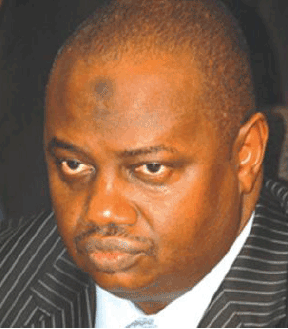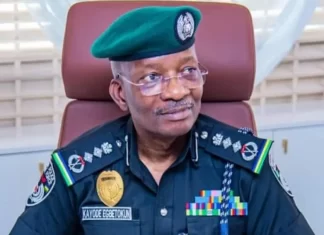Within a short period of the new administration, the EFCC seems to have got its groove back, swooping on former public figures for various allegations. Can the Commission sustain the tempo and possibly rekindle effort to push for accelerated trials of suspects, Senior Correspondent, ONYEWUCHI OJINNAKA, writes.

Within a short period of President Muhammadu Buhari’s administration, the Economic and Financial Crimes Commission (EFCC) arrested and arraigned four ex-governors, their sons as well as other public office holders at a stretch, on charges of money laundering, diversion of public fund and concealment.
Former governor of Adamawa State, Murtala Nyako, his son, Abdulaziz, and two aides, Zulkifkk Abba and Abubakar Aliyu, were arraigned before a Federal High Court, Abuja, on charges of embezzlement of state funds, while Ikedi Ohakim, erstwhile governor of Imo State, was docked on a three-count charge in another court at Abuja. Martin Elechi, former governor of Ebonyi State, was also quizzed.
Similarly, EFCC docked ex-Governor Sule Lamido of Jigawa State and his two sons, Aminu and Mustapha, and another, Aminu Wada Abubakar, before a Federal High Court, Kano, on an eight-count charge of bribery.
As if EFCC just woke up from slumber, it levied a fresh 50-count charge of money laundering against former governor of Bayelsa State, Timipre Sylva.
Also former Head of the Civil Service of the Federation, Stephen Oronsaye, was arraigned by EFCC before a Federal High Court, Abuja, over alleged pension fraud.
While Nyako and others were granted bail in the sum of N350 million by Justice Evo Chukwu, Ohakim was admitted to bail in the sum of N270 million bond and one surety who must have landed property in Abuja. However, Lamido and Oronsaye were granted bail unconditionally, but on self-recognition.
The gale of arraignments have raised questions on the activeness of EFCC, which has hitherto remained docile, as it has not been able to successfully prosecute and secure conviction of any of the cases involving former governors like Chimaroke Nnamani of Enugu State, Rasheed Ladoja of Oyo State, Joshua Dariye of Plateau State, other ex-governors and bank chiefs like Erastus Akingbola, Francis Atuche, Sebastine Adigwe, Batholomew Ojo and a host of others who have been standing trial for over seven years.
What could have inspired these arrests and arraignments might be the change of government which has given the EFCC back its bite by pronouncements against corruption. No doubt, the pronouncements by the Buhari administration to rid the country of corruption must have rekindled hope and inspired great expectations in Nigerians, thus putting EFCC on its toes in the fight against corruption. Can the commission sustain the tempo?
Prior to the recent development, Nigerians have lost faith in the Commission because it has gone comatose and unable to fight corruption head-long, but the latest offensive by the anti-graft agency raised questions on its seriousness and determination to tackle the monster ravaging the country.
What could have prompted the commission to wake up from slumber, having gone to sleep for a very long time, especially during the immediate past administration of Goodluck Jonathan? Nigerians are asking whether the agency just recovered its groove or could it be that its hands were tied? Could there be some other impediments in the performance of its statutory functions of arrest, investigation and prosecution. If there are, who and what could be responsible? Or could the sudden development be seen as an evidence of the ‘change’ mantra?
Olayinka Reuben, a public affairs commentator and member of Civil Liberties Organisation (CLO) said: “When a country’s anti-corruption agencies are getting back in the headlines for going after the big fish during the presidency of a man that abhors corruption, you have to assume that there is some form of pressure to impress.”
Nigerians expect EFCC to maintain the tempo with which it docked the immediate past governors and pursue the trial vigorously, ensuring accelerated trial and reducing frequent amendment of charges. It is very disgusting to note that the trial of governors docked since 2007 are still on. None of the trials has reached advanced stage of adoption of written submissions, not to talk of judgment. The only celebrated judgments secured by the Commission was the conviction of Cecilia Ibru and Tafa Balogun who were sentenced six months each, based on plea bargaining. Others were Olabode George (later pardoned) and ex-Bayelsa State governor, Diepreye Alamieyesigha (also pardoned).
However, EFCC spokesman, Wilson Uwujaren, rejected the impression that the commission has been in slumber, insisting that the commission has secured lots of convictions in the last few years.
“In the last three years, there has been progressive increase in terms of conviction returns. In 2013, our rate of conviction was 117 and that also shot up in 2014 to 126 convictions,” he disclosed.
Nigerians are not impressed with the figure because the conviction affected mostly the common and poor who could not ‘negotiate’ their way out, but the big ‘fishes’ who have all it takes to negotiate are allowed bail to junket from one part of the world to another without restriction.
Emeka Uchenna of Centre for Credible Change was reported to have said: “The reason for this is simple. Under the last administrations in the country, there was this half-hearted approach to fighting corruption. While the administration paid mere lip service to the war against corruption, serious attempts were also made to scuttle the operations of the commission. In many cases, the EFCC’s management had to correctly read the body language of those in authority before moving against any corrupt government official.”
He also posited that inadequate funding of the commission by the last administration might have affected its performance.
There have been lots of criticisms that the commission has lost its bearing in the fight against corruption, thus describing it as a toothless bulldog that can bark but not bite, having no muscle to do so. However, Nigerians have expressed surprise at the renewed vigour of the commission and its onslaught, though there has not been any major changes done at the commission.
Commenting on the development, Uwujaren, said: “I would not call it a new momentum. We are just doing what the commission was set up to do. What you are seeing or what you have seen in the last three weeks is a manifestation of the work that we have been doing in the last few years. Some of the investigations that have reached maturity today did not start yesterday. We have been on those investigations for a while. The reason people are saying this is the presence of many politically-exposed persons in the investigations. I think Nigerian journalists play too much emphasis on prominent persons. When you do not touch a governor or a minister, it is assumed that you are not working.
“People in the past talk about shoddy investigations, but that is no more. We take our time to conduct investigations before taking them to court. So, internal reforms have been executed to clean up our processes and procedures.
“In 2013, our rate of conviction was 117 and that also shot up in 2014 to 126 convictions. And that for us is a record. If you look around, there is no other law enforcement agency that has such record. And everywhere in the world, the benchmark for measuring effectiveness of any law enforcement organisation is your conviction return. And in that regard, we have done well.”
Commenting on judgments from the courts, Uwujaren said: “Like every Nigerian, I should be worried that some of the cases have not made progress like we have expected. But the issue we should focus our mind on is what is responsible for that lack of progress. Our job as a commission is to investigate and prosecute. It is the duty of the court to convict. We cannot investigate and also convict.
“So, if you take a case to court and it is dragging too long, that cannot be your fault, and all of us know what happens in the Nigerian courts. You take a matter to court and the accused person will come up with several applications, all intended to derail the trial. Presently, there are some cases we took to court in 2007 that are still at the plea bargain stage and that is not the fault of the commission.”














